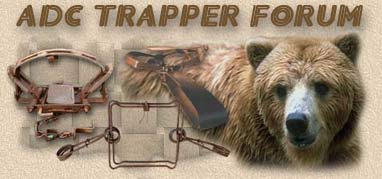|
 Re: How to deal with a difficult customer
[Re: Muddy Boots]
#3899099
Re: How to deal with a difficult customer
[Re: Muddy Boots]
#3899099
07/19/13 02:36 PM
07/19/13 02:36 PM
|
Joined: Feb 2011
New York
Jim Comstock

trapper
|

trapper
Joined: Feb 2011
New York
|
You can't always tell who will be problematic, but if I do I don't hesitate to pass on the job. Had one guy call on a beaver at his million dollar camp, sounded like from Saudi Arabia or something. Said, "money was tight, had had a lot of expenses," not endearing right off. He was more than an hour away, not somewhere I go often, with beaver in the boathouse, sometimes a tough job to begin with. Then he said, "I will be us in two days and would like to have the beaver gone before I get there." I basically said, so if I hang up, run to the truck and leave right now, which I not, and all goes perfectly, I might get payed. Wonder who was the lucky one to get that job?
|
|
|
 Re: How to deal with a difficult customer
[Re: Muddy Boots]
#3899521
Re: How to deal with a difficult customer
[Re: Muddy Boots]
#3899521
07/19/13 07:33 PM
07/19/13 07:33 PM
|
DaveK
Unregistered
|
DaveK
Unregistered
|
|
|
|
 Re: How to deal with a difficult customer
[Re: Muddy Boots]
#3904501
Re: How to deal with a difficult customer
[Re: Muddy Boots]
#3904501
07/23/13 06:13 AM
07/23/13 06:13 AM
|
DaveK
Unregistered
|
DaveK
Unregistered
|
Explain costs over the phone. Sign contract before you inspect. Use an inspection form, so he gets some value.
|
|
|
 Re: How to deal with a difficult customer
[Re: Muddy Boots]
#3906173
Re: How to deal with a difficult customer
[Re: Muddy Boots]
#3906173
07/24/13 05:21 AM
07/24/13 05:21 AM
|
Joined: Aug 2011
NE, NC
Big Bear Wildlif

trapper
|

trapper
Joined: Aug 2011
NE, NC
|
The last customer I had that was past 90 days, I shot an email to them on our return policy. Had a check in a week.
Be Green, Buy Fur.
NE- NC
|
|
|
 Re: How to deal with a difficult customer
[Re: Muddy Boots]
#3906235
Re: How to deal with a difficult customer
[Re: Muddy Boots]
#3906235
07/24/13 07:21 AM
07/24/13 07:21 AM
|
Joined: Jan 2013
OH
Eric Arnold

trapper
|

trapper
Joined: Jan 2013
OH
|
No pay or slow paying customers are just a part of doing business. How invoiced problems should be handled will first depend on your registered accounting method with the IRS, accrual or cash.
If your company is a cash based company you cannot claim the nonpayment as a "write-off". For a cash based company, taxes are assessed on how much money you collect. If there is no payment, then it is viewed as no service has been provided and it doesnít affect your taxable income.
If your company is an accrual based company you have to try and collect payment; however, after a certain amount of time trying you are then allowed to "write-off" the amount not received. The reason here is that accrual companies have to pay tax on services performed regardless if payment has been received. So if you say you did $1,000 worth of work you are taxed on that $1,000 regardless if our when youíve been paid.
When looking at how to collect payments, look at what the client owes then look at how much time and effort you will have to spend collecting it. Collection agencies take anywhere from 33% - 45% of the collected amount while court cases can end up costing you thousands in lost productivity and court costs.
For instance, if you have a cash based company and a client does not pay their $100 bill you need to ask yourself if it worth going after them or not. Is it worth paying a lawyer to send them a letter? Is it worth turning it over to a collection agency to hopefully get $55 - $67 sometime down the road? Is it worth paying $50 for small claims court, taking time of work to go, winning the judgment, and still not get paid? What if you lose the judgment? Should you put a lien on their house for the amount they owe? Is it better to just forget about them and focus on the next paying customer? There is no right or wrong answer here; it is all on how you want to run your business.
But, if you are an accrual based company and a client does not pay their $100 bill, you donít have a choice. You will need to try and collect it and it doesnít matter what method(s) you use.
When I started this response, I purposefully stated invoiced customers, as this is where the paper trail starts. Without an invoice (or payment receipt), it can be argued that there is no customer in which case it doesn't matter what accounting method you've chosen. It now becomes your decision to declare them as a client (make an invoice) and then decide what to do or put it down as a training experience.
For the specific situation of refusal of payment at time of service, I'd recommend calling the authorities and claiming theft if you have any intention of trying to get paid. Most (if not all) states have implied contracts that state you are entitled to payment for reasonable services rendered (as discussed by the attorney at the Cleveland WCT seminar) regardless of a signed contract.
Also, don't think that just because you've taken a credit card number/deposit/charge that it covers you either. All the customer needs to do is challenge the charge and if you don't have a signature authorizing it, you are going to lose it. Again, in cases like this you will have to take a look at the legal issues as well as accounting method to decide how to proceed.
The best way to not get taken advantage of is to collect payments when services are rendered. Collect your service fee immediately after performing services. For larger jobs, collect a deposit at the time of booking and a check the day work starts. Collect a third check when the project is 50 - 75% done with final payment due the day you finish.
Remember, this is your company and you get to set the terms so take advantage of it.
Eric Arnold
Publishing Editor W.C.T. Magazine
Editor The Fur Taker Magazine
|
|
|
 Re: How to deal with a difficult customer
[Re: Muddy Boots]
#3906419
Re: How to deal with a difficult customer
[Re: Muddy Boots]
#3906419
07/24/13 10:07 AM
07/24/13 10:07 AM
|
Joined: Dec 2006
Virginia
USNret

trapper
|

trapper
Joined: Dec 2006
Virginia
|
Lots of good advice here. These are my personal guidelines:
1. Traps set at the entry point (roofline) makes it pretty hard for most customers to empty traps unless they're really good on a 32' ladder.
2. Comstock traps are hard enough for us to set. Imagine a customer or neighboring AR trying to figure out how to open one with an angry coon in it. If I HAVE to set a trap on the ground it's going to be a tough one to open or one that is secured as well as I can to make it tamper resistant.
3.Electronic monitoring (e.g. Trap-Alert) provides instant notification of captures and documented trap activity that you can print out as proof.
4. Get it in writing, get their signature. Avoid customers you feel won't be paying or won't be paying in full. Uncle Kirk once told me he avoided anyone with the last name of Patel (Indian/Pakistani). That's not really the politically correct way to go about it, since some of them DO pay. But if they grew up haggling the price on everything from groceries to houses, you know you're going to go through it too. Same with shyster used car salesmen. I also avoid the "I'm-calling-for-my-aunt-twice-removed-who-isn't-home-this-month-so-just-do-the-job-and-she'll-pay-you", type of jobs. After a while you get the feel for who intends and who does not intend to pay you when you show up to do a job.
5.If they're complaining about price over the phone, I suddenly become too busy to fit them into the schedule and will refer them to other WCOs who do lousy work.
6. Interestingly, some of the richest people we've worked for were toughest to collect from. Apparently they got that rich by not paying anyone along the way and probably figure their status will make you, the lowly trapper, back down and quit bothering them. So call their bluff and have your lawyer send them a letter. They tend to pay when they see your balls are bigger than theirs.
7. Big Bear's right. I DO tell people that if they don't pay I'll bring their critters back. Amazing that they actually believe it, but that trick works.
8. And when all else fails, Phil's right, pure quill works. It may not get you paid, but sure makes you feel like you got your money's worth out of them.
|
|
|
|
|





